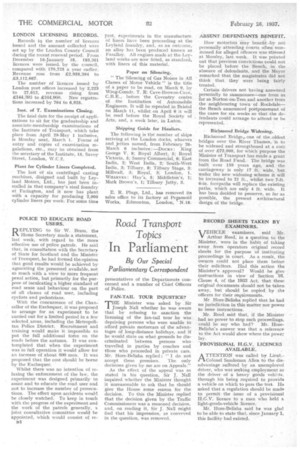Road Transport Topics _
Page 38

If you've noticed an error in this article please click here to report it so we can fix it.
In Parliament
By Our Special, Parliamentary Correspondent
presentatives of the Departments concerned and a number of Chief Officers of Police. POLICE TO EDUCATE ROAD USERS.
REPLYING to Sir W. Brass, the Home Secretary made a statement, last week, with regard to the more effective use of police patrols. He said that, in consultation with the Secretary of State for Scotland and the Minister of Transport, he had formed the opinion that good results would be achieved by agmenting the personnel available, not so much with a view to more frequent penal action, but primarily for the purpose of inculcating a higher standard of road sense and behaviour on the part of all classes of road user, including cyclists and pedestrians.
With the concurrence of the Chancellor of the Exchequer, it was proposed to arrange for an experiment to be carried out for a limited period in a few selected areas, including the Metropolitan Police District. Recruitment and training would make it impossible to put the full additional force on the roads before the autumn. It was contemplated that when the experiment was in full operation it would allow for an increase of about 800 men. It was proposed that the cost should be borne by the Exchequer.
Whilst there was no intention of relaxing the enforcement of the law, the experiment was designed primarily to assist and to educate the road user and not to increase the number of prosecutions. The effect upon accidents would be closely watched. To keep in touch with the progress of the experiment and the work of the "patrols generally, a joint consultative committee would be appointed, which would consist of re
pel FAN-TAIL TOUR INJUSTICE?
THE Minister was asked by Sir Joseph Nall whether he was aware that by refusing to sanction the licensing of the fan-tail tour he was depriving persons who were unable to afford private motorcars of the advantages of long-distance holidays, and if he would state on what grounds he discriminated between persons who travelled in parties by coaches and these who proceeded in private cars. Mr. Hore-Belisha replied : "I do not accept these premises. The only decisions given by me are on Appeals."
As the effect of the appeal was as stated in his question, Sir J. Nall inquired whether the Minister thought it unreasonable to ask that he should give the House some reason for the decision. To this the Minister replied that the decision given by the Traffic Commissioners was a reasoned decision, and, on reading it, Sir J. Nall might find that his impression, as conveyed in the question, was removed.
RECORD SHEETS TAKEN BY EXAMINE RS.
VEIIICLE examiners, said Mr. Arthur Reed, in a question to the Minister, were in the habit of taking away from operators original record sheets for the purpose of instituting proceedings in court. As a result, the owners could not place them • before their solicitors. Had this action the Minister's approval? Would he give instructions in view of Section 16, Clause 4, of the 1933 Act, that these original documents should not be taken away, but should be copied by the officers for their requirements.
Mr Hore-Belisha replied that he had no jurisdiction in this matter nor power to issue instructions.
Mr. Reed said that, if the Minister had no power to stop such proceedings, could he say who had? Mr. HoreBelisha's answer was that a reference to the Act would show where the power lay.
PROVISIONAL H.G.V. LICENCES AVAILABLE.
A TTENTION was called by Lieut.Colonel
Sancleman Allen to the disadvantage suffered by an unemployed driver, who was seeking employment az the driver of a heavy goods vehicle. through his being required to provide a vehicle on which to pass the test. He asked that a regulation should be made to permit the issue of a provisional H.G.V. licence to a man who held a light-goods-vehicle licence.
Mr. Hore-Belisha said he was glad to be able to state that, since January 1, this facility had existed.




























































































